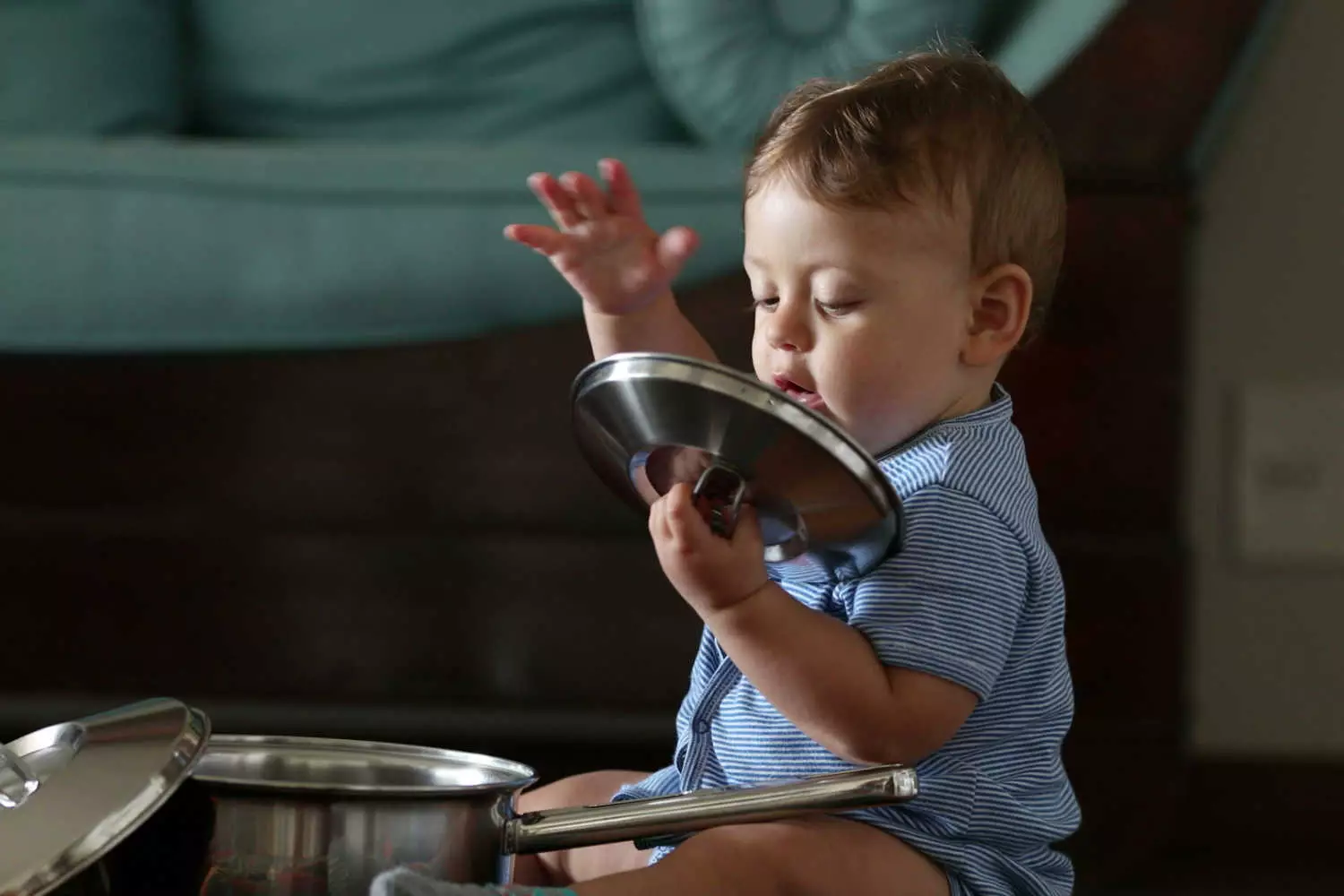
Pool Safety: Keeping Baby Safe Around the Pool
7 min readWritten by Editorial Team


Pool safety rules are important based on some hard facts. Children in the age group of one to four years are more at risk of drowning in a pool. Drowning is reportedly the second most common reason for death among kids under the age of 14. So let’s find out how to stay safe in the water. Among avoidable injuries, drowning is the leading reason for death for children between 1 to 4 years old. Babies love to be in the water, right from splashing time when they are two months or three months old to when they start standing. As the baby becomes older, parents start making them used to pool, so they start with inflated pools, and then the child starts accompanying them to the pools where they go.
A pool for a baby is more like a huge bathtub where there is ample space to splash around or move and play. Playing in a pool also helps them to learn swimming easily, thereby benefiting them with mixing with other kids, exercising, and getting refreshed. The major issue here is that babies are not aware of swimming. More than that, they do not have hand-to-eye coordination and the proper method for swimming. Other reasons that pave the way for the little one’s accidental drowning, near-drowning are too slippery surfaces, and malfunction of the swimming safety devices. Many drownings and near-drownings happen when a baby accidentally falls into a swimming pool.
In This Article
List of Top 8 Pool Safety Rules to Keep Baby Safe Around the Pool
Babies can go into the water from birth. It’s important, however, not to let them get too cold since they can’t regulate their body temperature like adults can. In addition, babies can catch infections from the water. As a result, it is generally best to wait until your baby is at least 2 months old before you take them swimming. Also, we need to follow the safety rules for pools as adults in order to avoid any potential hazards.
Given below are the top pool safety rules to keep the baby safe around the pool.
1. Always Be There For Supervision of Babies
Babies feel more secure if their parents or guardians are near them. At no cost should a baby in the pool be left unattended. Babies are too small to understand when they need to close and open their mouths in the water, so the adult should be alert as water can enter the lungs, and the baby’s health could be at stake. Apart from this, there must be an adequate bar to reach the side of the pool so that the rescue process does not take too long.
2. Learn CPR and Basic Water Rescue Skills
It is important to be aware with respect to water safety and even be conversant with administering CPR in the right manner, with knowing when it should be given. Always have first aid handy near the pool. Keep the brochures pasted with the guidelines of what needs to be done in an emergency. Once the baby is old enough, they can be taught swimming techniques. Generally, they only learn swimming once they are more than four years old.
[Read : CPR in Babies: Steps And Precautions]
3. Don’t Let the Baby’s Head Go Underwater

The pool is cleaned and sanitized, yet it is not advisable to let the head of the baby be underwater as there are several bacteria and viruses in it which the baby can swallow leading to several diseases. Also, in case they breathe inside this contaminated water, it can result in choking hazards.
4. Be Careful With Swim Toys
Supervising the babies while in the pool is the biggest responsibility of the adults as there are no alternatives or safety measures for the same. If using an inflated pool, they need to be cautious that it is done properly, and after each use, it should be properly deflated and kept back.
5. Keep Proper Safety Devices
It is always advisable to use adequate safety devices and not rely on baby floaters, tubes as these are not intended to prevent you from drowning. They are made by inflating air, and if not done properly or if it deflates accidentally, it can put the baby in danger.
6. Prevent the Babies From Going Shallow to the Deep Pool
The shallow pools are designed especially for babies, so it is advisable to let them play there and not let them explore the deeper ones.
7. Protection of Skin
Skin is one organ that gets majorly impacted when in the pool. It is common to get sunburns as the water reflects the sun’s rays in the pool. It is thus mandatory to apply a protective lotion or sunscreen and then keep the area covered. A baby’s skin is more sensitive and delicate than the adult’s, so they can have rashes instead of sunburns, so they should even apply a mild lotion or a rash-free cream that protects the skin making it soft and less painful. Be sure to keep the baby covered up with proper clothing through which air can pass.
8. Don’t Let Older Children Run and Play Around the Pool
Be strict with older children when it comes to playing around the pool. Prohibit running around the pool and pushing other kids into the pool. More drowning and near-drowning incidents reportedly happen when the baby is slipped or pushed into the deep part of the pool.
Teaching Tips For Parents

While some babies are eager to get into the water, others are more hesitant. Don’t force your baby to try anything they aren’t ready to, and watch their cues. Never submerge a baby. Even though it’s natural for infants to hold their breath, they’re also susceptible to swallowing water. It is because of this that babies are more likely to contract stomach flu and diarrhea from pool water and lakes.
A few teaching tips for parents regarding keeping babies safe around the pool include:
1. Start in the Bathtub
To get your baby comfortable with the water, you can start pool lessons in the bathtub. Make sure they feel safe and comfortable in the water. Pour a cup of water over your baby’s hair and let it fall over their face. This will help to get them used to water on their head. It will also help to alleviate their fear of water.
[Read : 5 Must-Read Tips For Keeping Baby Safe During Bath Time]
2. Time it Right
It is possible for a newborn to take a dip. If your baby’s belly button or circumcision has healed, you can introduce them to the water as soon as you feel comfortable. As a baby grows, their comfort level in the pool will increase. However, you should consult a pediatrician before introducing your baby to pool.
3. Make it Fun
It’s important that your baby gets comfortable in the water and enjoys the experience. A baby can sense how their parents feel very quickly. As a result, the best way to establish a relaxed and confident environment is to start with YOU. Play with the baby. Have fun with water toys.
4. Check the Temperature

Whenever you take your baby to a pool, if possible, make sure that the pool is heated. You should heat the pool to at least 32°C if your baby is younger than 6 months. Taking them into a heated pool is okay about 2 months after they’ve been born, but don’t let them remain in the water for longer than 10 minutes at first. Take them out of the water and wrap them in a towel if they start to shiver. It’s not advisable for babies under 12 months to stay in a pool for longer than 30 minutes.
If your baby is under six months old, a large public pool would be too cold for them. If no other option is available, you can still take your baby into a cooler pool, but you may need to get out every 10 minutes or so until the water warms up. Closely watch for color changes of lips, fingers, and toes. If they turn purplish, take the baby out of the pool right away.
5. Set the Mood
It is important to take your baby to the pool when they are in a good mood. Never take a hungry baby or a sleepy baby to the pool. During this pool time process, you want to make your baby feel confident and trusting in you.
Thus, keeping these pool safety measures under consideration will ensure the safety of the baby. Keep in mind that drowning and near-drowning incidents among babies usually happen in familiar pools like home pool, club pool, etc. Your little one can get into this mishap so quickly than you imagine. Even a distraction of a phone call for 2 min counts.
The pool time should be reminiscent of good and pleasant memories, and no hazardous events will be clipped to it. The baby will associate these good memories and can swim easily else he might develop a fear making it difficult for him to learn and enjoy.
[Read : Swimming For Your Child ]
FAQ’s
1. Is Chlorine in Pool Safe For Baby?
Chlorine can potentially irritate a baby’s skin and respiratory system. Infants swimming in chlorinated pools may have an increased risk of airway inflammation, according to some research. As a result, babies that get soaked and dipped in chlorine water are more likely to develop asthma, bronchiolitis, and skin rashes.
2. Can Babies Go in Normal Pools?
The majority of physicians recommend waiting at least 6 months before taking your baby swimming in a normal pool. When your baby is less than six months old, avoid taking him or her to a large public pool, as the water is too cold and the chance of infection is high.
3. What Temperature Should a Pool be For a Baby?
You should keep the temperature of pool water between 85 and 87 degrees Fahrenheit, so your baby feels comfortable. If he begins to shiver, you should get him out. Hot water is also dangerous. Children under the age of 3 should not use hot tubs, spas, or pools that are heated over 100 degrees Fahrenheit.

Editorial Team,
With a rich experience in pregnancy and parenting, our team of experts create insightful, well-curated, and easy-to-read content for our to-be-parents and parents at all stages of parenting.Read more.
Responses (0)
Want curated content sharply tailored for your exact stage of parenting?
Related articles

Having Ginger During Breastfeeding – Is it Safe?

Letting Baby Play With Household Items – How it Helps in Baby’s Development and Safety Tips

Date Syrup for Babies – When to Introduce and Top Benefits

Clinginess in Babies – When, How and Why

Old Mac Donald Rhyme For Babies

Life With PCOD After Marriage – A Complete Guide
Sponsored content
Discover great local businesses around you for your kids.
Get regular updates, great recommendations and other right stuff at the right time.





